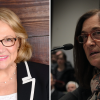In an appearance on Boston Public Radio on Tuesday, Boston Mayor Michelle Wu revealed that she voted for Boston City Councilor Ricardo Arroyo in the Suffolk County District Attorney primary, despite withdrawing her endorsement after the Boston Globe published an interview with a woman who alleged sexual assault.
Politics and policy, Wu said, were the most important consideration in the messy election with conflicting evidence of assault presented in redacted police files. According to released police reports, Arroyo was never charged with a crime.
“To see just major bombshell news dropped in all different directions just made the whole situation feel very discouraging and off-putting to many many people that I spoke to,” Wu said. “Ultimately I still came down on having seen at least some resolution of where part of the allegations stood. ... For me, it was about positions.”
The resolution she references came from one of Arroyo’s two accusers, who has come to his defense since the allegations resurfaced, saying through her lawyer at a press conference that he never assaulted her and that he was, in fact, a friend.
Meanwhile, the second accuser stood by her allegation, condemning politicians who supported him.
“It makes me feel sick, sick to my stomach,” she told the Globe. “I see so many people continuing to endorse him without finding out more. As the potential DA, women are not going to feel safe calling his office. Their cases won’t get heard. ... All those people will be afraid to come forward.”
When asked about the second accuser, Wu did not respond to her comments specifically, reemphasizing the race’s lack of focus on the policy issues. “I don’t want to get into all the details of files and documents,” she told Boston Public Radio.
“I have read through every line of every bit of every piece of paper that was available,” Wu said. “And I think the voters have spoken, and ultimately this race ended up focusing, by the end, less about policy positions and the future steps and actions of this office, which is unfortunate. There’s a lot of healing and trust building that needs to happen.”
The latest on transit
Wu also praised the MTBA’s progress three weeks into the month-long Orange Line shutdown, sounding positive about the progress that the MBTA is making on its repairs. “Just about everything possible that could be done has been done,” she said.
But she cautioned that the repairs this month can only go so far in addressing the problems of the T, which do not end with infrastructure. Staffing challenges, she explained, will continue to stunt progress on the path to a fully functional system.
“One big key that has not been resolved and will take time to resolve is staffing levels,” Wu said. “Whether it’s Boston Public Schools or companies across our city, small businesses, we see the impact of needing to fill roles, and when the T is so short on [staff], it will still take some time to build that workforce back to be able to run at full speed.”
When asked about MBTA leadership and questions of federal intervention, she emphasized the importance of making sure that the people and workers behind the organization have a seat at the table. The new board that governs the MBTA, with its seven appointees chosen by Gov. Charlie Baker last year, include local private-sector leaders and elected officials.
Wu said Boston needs to have a seat on the MBTA board.
“[We need to] make sure that those who use the system every day have the greatest voice in decision making,” she said. “The city of Boston and all municipalities covered by the T’s footprint haven’t had a direct vote on the budget of the T for the last eight years or so. We are very close to Boston being able to have a seat.”
Wu also talked about the late arrivals of buses at the start of the school year, expressing disappointment about their early performances, but seeming optimistic about the future.
Citing a figure that only 50% of buses arrived before the bell on the first day of school, she said: “That is not anything that we can accept as a passing grade…by today we are at over 70% for on time…and 92% arriving within 15 minutes.”
Driver’s licenses
On Friday, the state’s elections division confirmed that voters will get the chance to decide on whether immigrants without legal status, often called undocumented immigrants, should be allowed to get driver’s licenses through the Registry of Motor Vehicles. The policy has wended its way through the State House for nearly 20 years and was signed into law over Baker’s veto in June.
But its passage sparked a backlash. A committee formed later that month gathered more than 70,000 signatures for a referendum, which would allow voters to repeal the law before it goes into effect next summer.
Wu expressed her support for allowing such immigrants to get licenses Tuesday.
“We are a home to many immigrant residents," Wu said. “Twenty-nine percent of our residents in Boston were born not in this country, and a proportion of our community is undocumented immigrant residents who pay taxes, who work, who contribute to our economy. And who are on our roads.”







